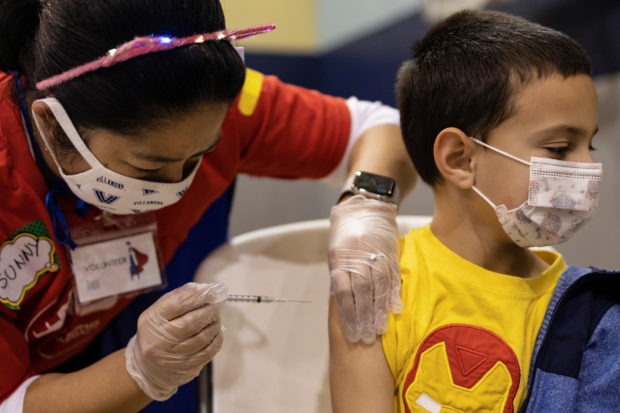
FILE PHOTO: Jace Quinones, 7, receives the Pfizer-BioNTech coronavirus disease (COVID-19) vaccine in Lansdale, Pennsylvania, U.S., December 5, 2021. REUTERS/Hannah Beier
The U.S. Centers for Disease Control and Prevention (CDC) on Thursday recommended the COVID-19 vaccine booster for children ages 5 to 11 after an advisory panel voted to back them, at least five months after completing their primary vaccination course.
CDC Director Rochelle Walensky said in a statement that she “endorsed” the vote by the Advisory Committee on Immunization Practices “to expand eligibility for COVID-19 vaccine booster doses. Children 5 through 11 should receive a booster dose at least 5 months after their primary series.”
“With over 18 million doses administered in this age group, we know that these vaccines are safe, and we must continue to increase the number of children who are protected,” Walensky added.
The advisers considered data from the CDC that showed protection from the initial two shots starts to wane over time, and that boosters in older age groups improved efficacy against severe COVID and hospitalizations.
The Food and Drug Administration authorized booster doses of the Pfizer/BioNTech vaccine for the age group on Tuesday as COVID cases are on the rise again in the United States.
READ: FDA to soon authorize Pfizer’s COVID booster shot for younger kids — NYT
The U.S. government has been pushing for eligible Americans to get boosted, but fewer than half of those who are fully vaccinated have rolled up their sleeves for an additional shot.
Pfizer said at the meeting that data showed a third dose of its vaccine generated a strong immune response against the Omicron variant in healthy children ages 5-11 years.
The CDC also presented safety data showing that the incidence of heart inflammation after vaccination in the age group was significantly lower than in adolescents and young adults.
Just over 29% of U.S. children ages 5-11 are considered fully vaccinated with two doses of the Pfizer/BioNTech shot. The vaccine is not yet authorized for children younger than 5.
The vaccine committee voted 11 to 1 to recommend the additional shots, with one doctor abstaining.
Dr. Helen Keipp Talbot, a professor at Vanderbilt University, was the lone committee member to vote against recommending the boosters, arguing that the focus should be on increasing the vaccination rate in the age group.
“Boosters are great once we’ve gotten everyone their first round,” she said.
Companies are already looking into the possible need for redesigned COVID-19 vaccines for the fall to target new variants of concern.
CDC scientist Dr. Amanda Cohn said redesigned vaccines may not be available for children right away because the pediatric shots are a different formulation than what would be given to adults.